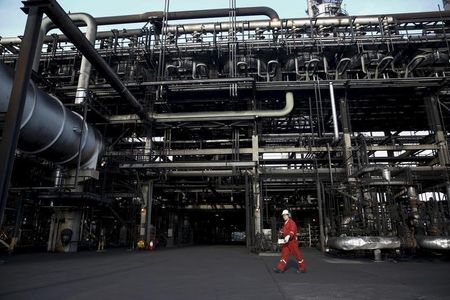JOHANNESBURG (Reuters) – South Africa is considering building an oil refinery that will process Iranian crude to bolster its petrol supply and reduce its dependence on foreign companies, a government official said on Tuesday.
Plans for the new refinery were being “conceptualised” Tseliso Maqubela, the deputy director general for petroleum and petroleum products regulation at the energy ministry, said. He could not estimate the cost or time frame for construction.
Pretoria has said it will resume oil imports from Tehran “tomorrow” if sanctions are lifted but without its own refinery, it would have to rely on foreign oil companies who own refineries in Africa’s most developed economy.
A landmark pact clinched on July 14 between Iran and the United States, Germany, France, Russia, China and Britain will limit Iran’s nuclear programme to ensure it is not put to making bombs in exchange for a removal of economic sanctions.
Before sanctions, Iran was the biggest oil supplier to South Africa, the continent’s second-biggest crude consumer, importing around 380,000 barrels per day (bpd).
Iran and the ruling African National Congress (ANC) share strong diplomatic relations, with Tehran backing the party that helped liberate South Africa from white minority rule. Iran was one of the first countries to resume trade with Pretoria after democratic elections in 1994.
“There are benefits to owning a refinery, basically the profits are re-invested in the country and outflows can be controlled,” said Maqubela.
“But most importantly you are able to protect your own sovereignty…we could not bring Iranian crude oil during the sanctions, even though the U.S. gave us an exception, because we did not have a facility where the crude could be refined.”
South African refineries were designed to refine Iranian crude but were refitted to process other types of oil after the sanctions.
“We believe it’s better to have a technology partner, a partner who will bring the financing and then a partner that can bring crude oil,” he said without naming specific partners.
Deputy Energy Minister Thembisile Majola said last Thursday South Africa was considering using Iranian oil for its new refinery which will add to the existing gas-to-liquid plant run by state-owned PetroSA.
Maqubela said the energy ministry was considering using a refinery planned, but not yet built, by PetroSA in the industrial port of Coega but that the eventual refinery may take another form and name or be located in a different region.
South Africa’s blueprint for growth and development, launched in 2012, gives the government until 2017 to develop new refinery plans to cope with growing fuel demands.
(by By Peroshni Govender, Reuters)




